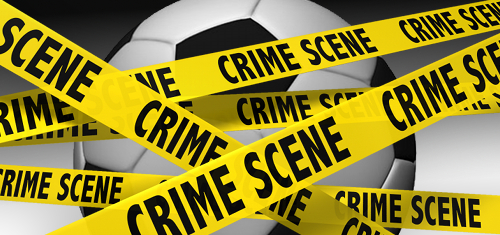 Global football body FIFA has banned a South African official for his role in match-fixing shenanigans during friendly matches leading up to the 2010 World Cup.
Global football body FIFA has banned a South African official for his role in match-fixing shenanigans during friendly matches leading up to the 2010 World Cup.
On Wednesday, FIFA banned Lindile Kika from all football activity for six years. A FIFA investigation found the former head of national teams for the South African Football Association guilty of five ethics violations involving “several” international friendlies played in South Africa prior to the 2010 tournament.
FIFA declined to specify Kika’s transgressions, but stressed that no players were involved. Kika has been linked to notorious Singapore-based fixer Wilson Perumal’s Football 4U group, who preferred to buy off referees. The matches in question reportedly involved teams from Thailand, Bulgaria, Colombia and Guatemala.
ENTIRE CANADIAN FOOTBALL LEAGUE CORRUPT?
A vastly more alarming allegation was made Wednesday by the International Centre for Sport Security (ICSS), which claimed 42% of the matches of the Canadian Soccer League (CSL) 2015 season show signs of suspicious betting activity. The ICSS believes the fixers reaped £4.5m in “fraudulent betting profits.”
The ICSS report says all 12 teams in the CSL’s first division played in at least three “suspicious” games this year. ICSS exec director Chris Eaton expressed confidence that every CSL team has been “directly or indirectly corrupted,” allowing for the possibility that many teams were ignorant of the fact that they’d played in a tainted match.
The ICSS maintains that the CSL “has become a type of ‘rogue league’ that has not been seen before.” The ICSS investigation led it to conclude that “the existing CSL competition is being operated for the main purpose of perpetrating a highly organized and endemic betting fraud … it seems the fixers have become greedy in 2015 and have looked to fix as many matches as possible.”
The Canadian Soccer Association decertified the CSL following an earlier tampering scandal involving European fixer Ante Sapina. Following the ICSS’ most recent investigation, Eaton says he alerted the Royal Canadian Mounted Police, who Eaton claims viewed the case as “a low priority, with no victims.”
CSL reps told The Telegraph they were shocked by the allegations but insisted the league had been keeping a closer eye on things since the previous scandal. Queried about an incident in which a CSL player tweeted his disgust after his teammates kept trying to score an own goal, CSL secretary Stan Adamson said the teams in question had just been “playing silly buggers” after one side had three men sent off for arguing with officials.
CSL president Vincent Ursini acknowledged that suspicious betting activity was worrisome and that it was the league’s responsibility “to try and get some traction on this matter with the authorities.”
ESSA PAINTS BRIGHTER PICTURE
Ironically, Wednesday’s news followed a report by sports integrity body ESSA that said suspicious betting activity had fallen in Q3 2015. ESSA’s global betting operator partners reported 73 alerts during the three-month period, of which 18 alerts were found to be suspicious. That’s down from 24 and 23 suspicious alerts, respectively, in Q1 and Q2. Football ranked second on the Q3 individual sport list, but its four suspicious alerts were well back of the 13 reported in tennis matches.
